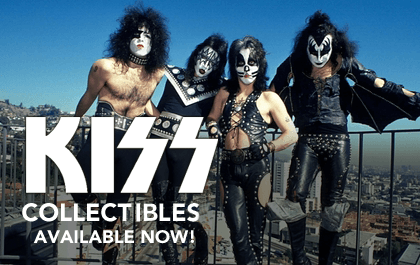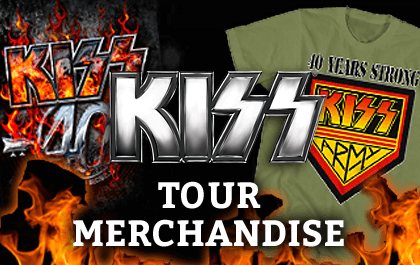KISS TALK END OF THE ROAD & MORE WITH CLASSIC ROCK

KISS are on their farewell tour, so we joined the Gods Of Thunder on their private jet to look back over an explosive career
By
Iggy Pop claimed that he killed the 60s, but it turned out it was four semi-normal guys right off the streets of New York who really drove the final stake through heart of the peace-and-love decade nearly 46 years ago.
Gene Simmons, a former elementary school teacher; Paul Stanley, a cab driver with a heart-shaped face; Peter Criss, a sometime butcher and itinerant drummer who studied under the mighty Gene Krupa; and Ace Frehley, a gang member-cum-liquor delivery man. They stormed out of a $40-a-month fourth-floor walk-up in New York’s Chinatown in their six-inch platforms and sweaty black leather looking like four beasts disgorged from the underworld, and unleashed an unholy and entirely masculine creed of sex, braggadocio, innuendo and conquest, all delivered at a screeching 110 decibels and addressing every young man’s fantasies.
While the band’s message has changed over the years (they’ve become more family-friendly and forswear any cursing during the show), they still attract legions of foot soldiers into the Kiss Army – even now, when they’re calling it quits in one final tour they’ve dubbed the End Of The Road. (They’ve attempted to trademark the term with the US Patent office to prevent any other retiring bands from using it. Good luck with that.) So far, 44 shows have been played in North America, with another 25-date run beginning in August. The European leg begins next week, and there are plans to extend the tour until, probably, mid-2020.
Back at the beginning, the band were fuelled by high ambition, an unrelenting will, a prodigious work ethic and only the most rudimentary of musical talents. But they not only changed the face of musical history by painting it in Stein’s Clown White, they also kicked off their own brand of revolution, putting music back in the hands of the ordinary people and turning it back into a populist manifesto, picking up where Grand Funk Railroad left off by knocking rock music off of its lofty perch, stripping it of its perfect hair, wrecked cool and tight velvet stovepipe pants.
Prior to Kiss, rock stars seemed to exist in some distant Valhalla, breathing saffron-scented air, buying and wrecking Aston Martins, imbibing rare substances worth a king’s ransom and rarely consorting with mere mortals unless they looked like supermodels or Beatle wives. In short, rock stars were not like the rest of us.
But the members of Kiss were. They were a little unfinished. Outsiders, really, not the captains of the football team with a blonde cheerleader on their arm. Instead they more resembled the guy who sat next to you in Advanced Mathematics class. Meaning they were smart guys. Smart enough to know their history, and figuring out it was just about time for a sea change.
“It was the mid-seventies, and people had had enough of the hippie, political thing and just wanted to have a good time,” Gene Simmons explained a few years ago. In the early days, Paul Stanley was fond of saying: “We are our fans.” While not exactly true, it was an appealing notion. These days he’s altered it a little, saying: “Our fans may not look like us but they can feel like us. I think that in our own way we’ve motivated people to, in their own way, be Kiss. Whether it’s to become a writer, whether it’s to become a country singer, whether it’s to become an attorney, you name it.”
CLICK HERE to read the rest of the story now!





